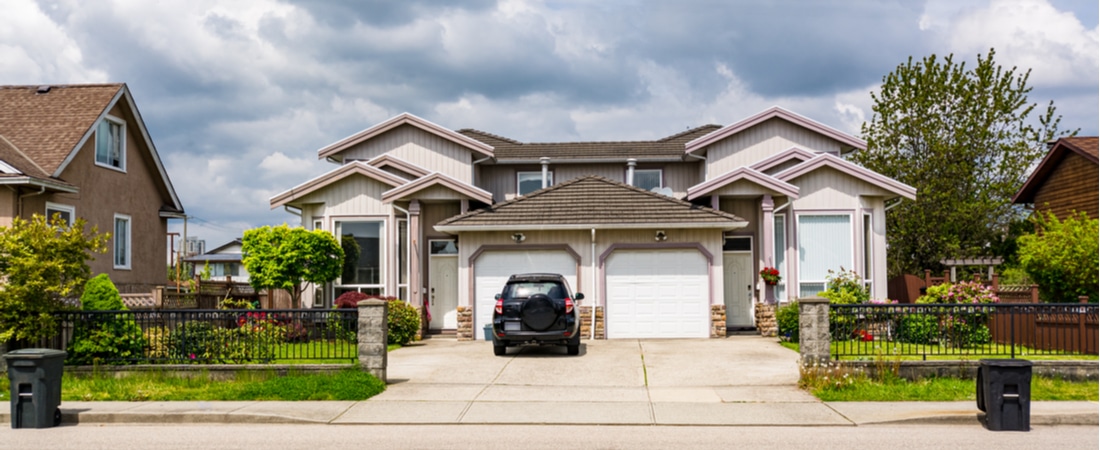Buying a duplex with friends: primary residence or investment property? This reader wants to know how taxes work if all four of them are on the financing and title.
Q: My partner and I plan to purchase a duplex with friends. We would live on one side, and our friends (who already own their forever home) would rent out the other side. Eventually we plan to purchase a home for ourselves and rent out both sides of the duplex.
If all four of us are on the financing and title, is the property considered a primary residence or an investment property? I have heard this will substantially change how much we pay in taxes.
(By the way, I read Ilyce’s book 100 Questions Every First-Time Home Buyer Should Ask Before Buying Your First Home and found it very helpful. Thanks for all the great resources!)
Buying a Duplex With Friends: Primary Residence or Investment Property?
Primary Residence
A: Multiple people can own the same property together, but hold those interests differently. For you and your partner, the home will be your primary residence – at least for now, and as such, it will be considered residential (i.e. owner-occupied) and will not be an investment for you. On the other hand, your friends’ purchase of their share of the property will be an investment for them.
As long as you live in the property as your primary residence, your share of the ownership of the home will continue to be as a primary home for you and the Internal Revenue Service shouldn’t consider the property as an investment when it comes to your federal income taxes.
That said, there are different kinds of taxes that affect your purchase of the home. If you live in the property as your primary residence, you might get a benefit from your local taxing body that lowers your annual real estate tax bill. And, assuming you itemize, you’ll also be able to deduct your real estate taxes from federal income taxes (subject to current limitations). At the present time, a married couple can only deduct up to $10,000 in state and local taxes on their federal income taxes.
Lastly, if you have owned the property as your primary residence for two out of the last five years and make a profit on the sale of the building, you won’t pay federal income taxes on up to $500,000 in profits if you and your spouse are married or $250,000 for each individual.
Investment Property
On the other hand, your friends will consider the purchase of the property as an investment. The rent they receive will be taxed to them as ordinary income but they will have the ability to offset that income by the expenses of the property including the real estate taxes. Down the line when you sell the property, they will have to pay taxes on the profits that come from the sale of the building. Currently, the rate of tax on capital gains is up to 20 percent plus the 3.8 percent Medicare tax, or a maximum amount of 23.8 percent on those profits.
In turn, your friends, as investors, will also get to depreciate their interest in the building. In the simplest of terms, this would mean that your friends get to depreciate a chunk of the building cost while they own the property. This allows them to reduce their yearly federal income taxes depending on how much profit they have on this building and other investments. If they have losses due to depreciation or because the expenses of the building far exceed the rent they get out of the unit they rent, they may be limited in the amount they can take in losses due to Internal Revenue rules.
ur friends sell the building, they’ll have to pay back the depreciation by paying a 25 percent tax on the amount depreciated (known as recapture). They can defer paying all taxes on the sale, including the recapture of depreciation tax, by using a provision in the Internal Revenue Code Section 1031.
How 1031 Exchanges Work
Section 1031 (known in some places as a 1031 Exchange or a Starker Trust) would require them to close on a replacement property of equal or higher value than the property they sold within 180 days of the sale of this property. There are other rules and requirements, but your friends could jump from owning this property to owning another one without paying federal income taxes when this one is sold.
When you buy a different property and rent out your unit, the property will become an investment property and you’ll be able to enjoy some of these other tax benefits. What you may lose, however, is the ability to sell the property and keep up to $250,000 in profits tax-free (or up to $500,000 if you’re married). On the other hand, if you decide to sell what will by then be an investment property and buy another one, you also would be eligible to use a 1031 Exchange, deferring taxes by purchasing another property that costs at least as much as the sales price of this property.
We like the idea of your friends helping you buy a future investment property and hope you enjoy being landlords together going forward. But to preserve that friendship, you may wish to hire an attorney to draft a partnership agreement, that spells out the ownership and financial responsibilities of owning that property, including what happens if one partner wants to sell and the other does not.
Good luck!
More on Topics Related to: Buying a Duplex With Friends: Primary Residence or Investment Property?
How Much Tax Do You Pay When You Sell a Rental Property?
Is a Rental Property a Good Investment?
What Happens to Your Taxes When You Rent-to-Own to a Family Member?
How Do I Avoid Paying Taxes When I Sell My Rental Property?
Should You Put Your Rental Property in an LLC?







Leave A Comment